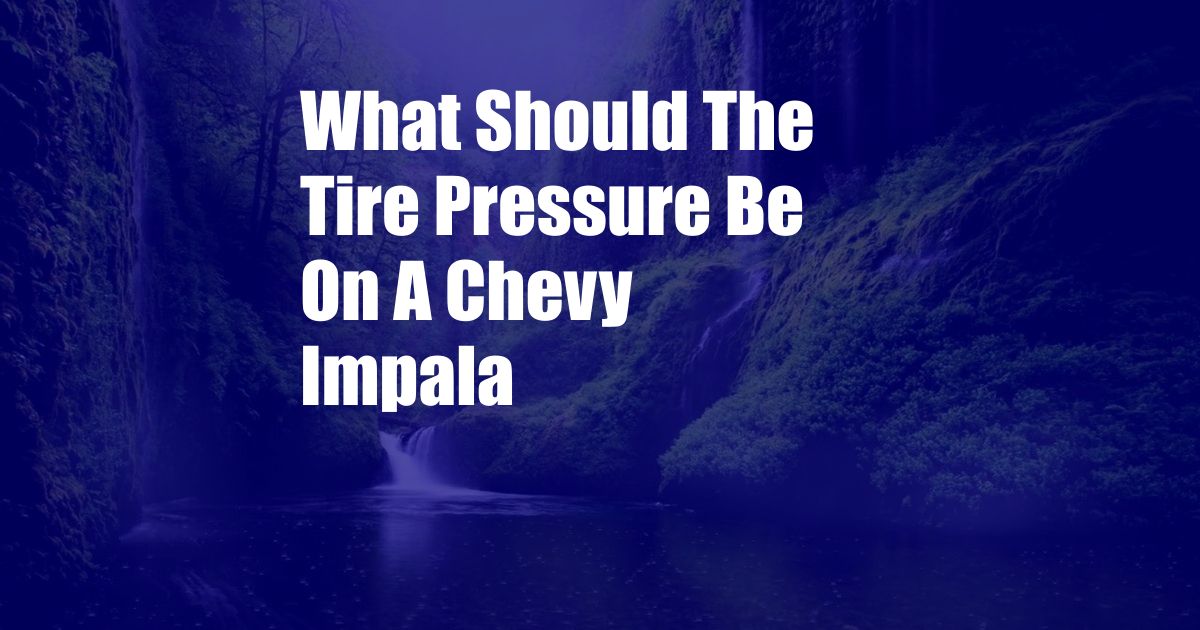
What Should the Tire Pressure Be on a Chevy Impala?
As a proud owner of my Chevy Impala, I’ve always taken meticulous care of my car. One aspect that I pay particular attention to is maintaining optimal tire pressure. Over the years, I’ve gathered valuable knowledge about the importance of correct tire inflation and how it impacts the performance, safety, and longevity of my vehicle.
In this comprehensive article, I’ll delve into the intricacies of tire pressure for Chevy Impalas, including the recommended pressure levels, the consequences of incorrect inflation, and expert tips for maintaining proper tire pressure. Whether you’re a seasoned driver or a new Impala enthusiast, this guide will equip you with the knowledge to keep your tires in pristine condition.
Recommended Tire Pressure for Chevy Impalas
Determining the correct tire pressure for your Chevy Impala is crucial for achieving optimal performance and safety. According to the manufacturer’s specifications, the recommended tire pressure for most Chevy Impala models is 32 psi (pounds per square inch) for both front and rear tires.
However, it’s important to note that tire pressure can vary slightly depending on the specific year, model, and trim level of your Impala. To ensure you have the most accurate information, always refer to the owner’s manual or the placard typically located on the driver’s side door jamb of your vehicle.
Consequences of Incorrect Tire Pressure
Maintaining proper tire pressure is essential for several reasons. Incorrect inflation levels can lead to a range of negative consequences, including:
- Reduced Fuel Efficiency: Underinflated tires increase rolling resistance, which results in higher fuel consumption.
- Premature Tire Wear: Overinflated tires wear prematurely at the center of the tread, while underinflated tires wear excessively on the edges.
- Impaired Handling and Stability: Incorrect tire pressure can affect the handling characteristics of your Impala, reducing stability and responsiveness.
- Increased Risk of Blowouts: Severely underinflated tires are more susceptible to blowouts, which can be dangerous and potentially lead to accidents.
Factors Affecting Tire Pressure
Several factors can influence tire pressure, including:
- Temperature: Tire pressure increases as the temperature rises and decreases as the temperature falls. It’s recommended to check tire pressure when tires are cold (before driving).
- Load: Heavier loads require higher tire pressure to maintain proper inflation.
- Tire Size: Different tire sizes have different recommended pressure levels. Always check the owner’s manual or tire placard for the correct pressure.
- Tire Age: Tires naturally lose air over time, so it’s important to check tire pressure regularly, especially on older tires.
Tips and Expert Advice for Maintaining Proper Tire Pressure
To ensure your Impala’s tires are always properly inflated, follow these tips:
- Check Tire Pressure Regularly: It’s recommended to check tire pressure at least once a month and before long trips or when carrying heavy loads.
- Use a Tire Pressure Gauge: A reliable tire pressure gauge is essential for accurate measurements.
- Inflate Tires to the Recommended Level: Refer to the owner’s manual or tire placard for the correct pressure specifications.
- Don’t Overinflate: Overinflation can cause excessive center wear and reduce tire life.
- Adjust Pressure for Load and Temperature: Increase tire pressure when carrying heavy loads or driving in high temperatures.
FAQ on Tire Pressure for Chevy Impalas
Q: What is the recommended tire pressure for a 2020 Chevy Impala?
A: The recommended tire pressure for a 2020 Chevy Impala is 32 psi for both front and rear tires.
Q: How often should I check my tire pressure?
A: It’s recommended to check tire pressure at least once a month and before long trips or when carrying heavy loads.
Q: What are the consequences of underinflated tires?
A: Underinflated tires can lead to reduced fuel efficiency, premature tire wear, impaired handling, and increased risk of blowouts.
Q: Can I overinflate my tires to improve handling?
A: No. Overinflation can cause excessive center wear and reduce tire life. Always inflate tires to the recommended pressure level.
Conclusion
Maintaining proper tire pressure is crucial for the performance, safety, and longevity of your Chevy Impala. By understanding the recommended pressure levels, the consequences of incorrect inflation, and the factors that affect tire pressure, you can ensure your tires are always in optimal condition.
Remember to check tire pressure regularly, adjust pressure according to load and temperature, and follow the expert tips outlined in this article. By following these guidelines, you can keep your Impala running smoothly and safely.